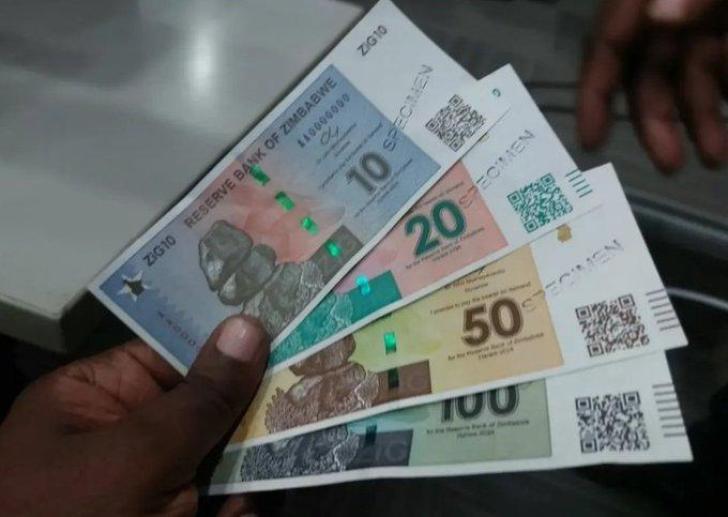News / National
'ZiG must go'
24 Oct 2024 at 07:02hrs |
0 Views

The Zimbabwe Gold (ZiG) currency is facing mounting pressure from the business community, which is advocating for its removal due to increasing volatility, despite the Reserve Bank of Zimbabwe's (RBZ) insistence that the six-month-old currency is here to stay.
At a CEO Africa Roundtable (CEO ART) breakfast meeting held in Harare yesterday, Oswell Binha, the chairperson of CEO ART, described the ZiG as a tool for arbitrage that has caused more harm than good to the economy. He pointed out that the ZiG appears to be following the trajectory of its predecessors - the Zimbabwe dollar, RTGS dollar, and bond notes - which were all eventually scrapped.
Binha provocatively called for the immediate removal of the ZiG from the currency basket, urging a return to other currencies until a stable local currency could be established. "We need to have time to have these serious conversations of a currency referendum involving everybody to navigate and decide which currency to use," he stated, emphasizing the need for broader involvement from economic players in determining the future of the nation's currency.
The ZiG, which authorities claim is backed by gold and forex reserves, has faced significant depreciation recently, particularly against the US dollar on the parallel market. Last month, the RBZ was compelled to devalue the ZiG by 43%, adjusting it to ZiG24.39 per US dollar. Currently, the dollar trades at ZiG27.28 on the interbank market, with rates reaching between ZiG35 to ZiG40 on the parallel market. Consequently, many businesses have started opting to report financial results in US dollars rather than the local currency.
Despite the criticisms, RBZ Deputy Governor Innocent Matshe asserted that Zimbabwe is not in a currency crisis. "Make no mistake about the ZiG; it is here and it is here to stay," he affirmed, arguing that the currency is not in danger of collapse and that the market is determining an appropriate exchange rate.
Introduced at a rate of ZiG13.50 to US$1, the ZiG was touted as a stable currency backed by gold and other precious minerals. However, ongoing volatility has led informal traders and formal businesses to reject the currency. Economic analysts are advocating for a more flexible exchange rate policy to enhance the acceptability of the ZiG.
Matshe maintained that the RBZ has already allowed for greater flexibility in the interbank market and rejected claims that the ZiG is failing. He noted that current monetary policy measures are adequate for supporting short- to medium-term economic growth and that inflation is expected to stabilize.
Economist Prosper Chitambara emphasized the need for continued reforms alongside the multi-currency regime. "A combination of monetary, institutional, and fiscal reforms are critical for restoring confidence and trust in the local currency," he stated, suggesting that a balanced approach is necessary without leaning towards complete de-dollarization or full dollarization.
As Zimbabwe navigates this complex economic landscape, the future of the ZiG and its acceptance among businesses remain uncertain, with calls for reform intensifying in light of ongoing challenges.
At a CEO Africa Roundtable (CEO ART) breakfast meeting held in Harare yesterday, Oswell Binha, the chairperson of CEO ART, described the ZiG as a tool for arbitrage that has caused more harm than good to the economy. He pointed out that the ZiG appears to be following the trajectory of its predecessors - the Zimbabwe dollar, RTGS dollar, and bond notes - which were all eventually scrapped.
Binha provocatively called for the immediate removal of the ZiG from the currency basket, urging a return to other currencies until a stable local currency could be established. "We need to have time to have these serious conversations of a currency referendum involving everybody to navigate and decide which currency to use," he stated, emphasizing the need for broader involvement from economic players in determining the future of the nation's currency.
The ZiG, which authorities claim is backed by gold and forex reserves, has faced significant depreciation recently, particularly against the US dollar on the parallel market. Last month, the RBZ was compelled to devalue the ZiG by 43%, adjusting it to ZiG24.39 per US dollar. Currently, the dollar trades at ZiG27.28 on the interbank market, with rates reaching between ZiG35 to ZiG40 on the parallel market. Consequently, many businesses have started opting to report financial results in US dollars rather than the local currency.
Despite the criticisms, RBZ Deputy Governor Innocent Matshe asserted that Zimbabwe is not in a currency crisis. "Make no mistake about the ZiG; it is here and it is here to stay," he affirmed, arguing that the currency is not in danger of collapse and that the market is determining an appropriate exchange rate.
Introduced at a rate of ZiG13.50 to US$1, the ZiG was touted as a stable currency backed by gold and other precious minerals. However, ongoing volatility has led informal traders and formal businesses to reject the currency. Economic analysts are advocating for a more flexible exchange rate policy to enhance the acceptability of the ZiG.
Matshe maintained that the RBZ has already allowed for greater flexibility in the interbank market and rejected claims that the ZiG is failing. He noted that current monetary policy measures are adequate for supporting short- to medium-term economic growth and that inflation is expected to stabilize.
Economist Prosper Chitambara emphasized the need for continued reforms alongside the multi-currency regime. "A combination of monetary, institutional, and fiscal reforms are critical for restoring confidence and trust in the local currency," he stated, suggesting that a balanced approach is necessary without leaning towards complete de-dollarization or full dollarization.
As Zimbabwe navigates this complex economic landscape, the future of the ZiG and its acceptance among businesses remain uncertain, with calls for reform intensifying in light of ongoing challenges.
Source - newsday
Join the discussion
Loading comments…






























